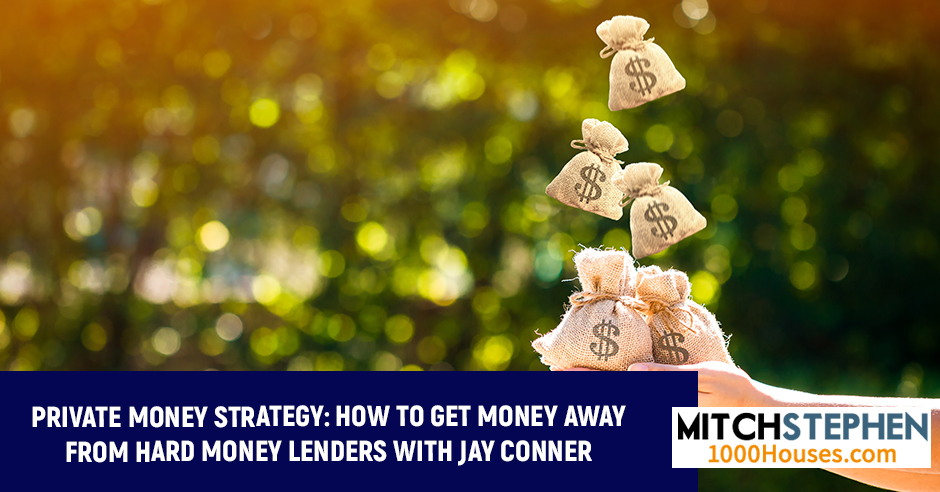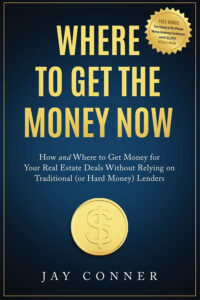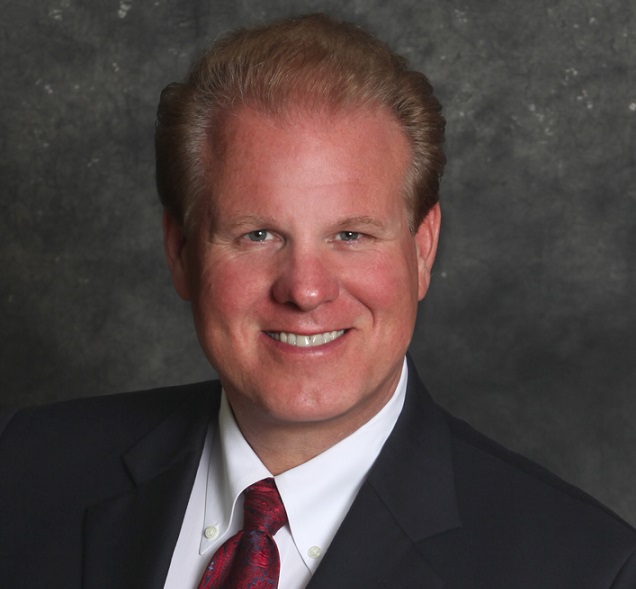PODCAST
Private Money Strategy: How To Get Money Away From Hard Money Lenders With Jay Conner
Episode 473: Private Money Strategy: How To Get Money Away From Hard Money Lenders With Jay Conner

One of the barriers to starting a career in real estate is finding the money for the deals. If you don’t think the traditional hard money lenders are a fit for you, then why not get your hands deep into private money? In this episode, Mitch Stephen talks to Jay Conner, the president of The Private Money Authority, all about private money—starting with his journey and down to the ways he has been helping investors attract money. He also lets us in on his book, Where to Get Money Now, where he teaches five easy, simple steps to have millions of private money available. Trying to lend from the banks can be tough and often discouraging. But in the world of private money, you set the rules. Allow Jay and Mitch to shed light on the things you can do in real estate with private money in this conversation.
—
I’m here with Jay Conner. We both attended a Mastermind with Ron LeGrand a long time ago. It was my pleasure to meet him. We overlap sometimes. We also do things a little differently. True to the whole point of this show, I don’t care how you get it done, just get it done. The point is to become financially independent enough so that you can become the person that you are supposed to be. Someone was asking me, “Are you going to interview Jay, doesn’t he sell a course on the same thing you sell a course on?” I said, “Yeah, but it doesn’t matter.” Maybe he speaks your language and I don’t speak your language or vice versa. It doesn’t matter to me which one, just figure out how to do it and do it, and get on with it. Dave Ramsey, they do the primal scream when someone gets debt-free. At my office, we ring the bell when someone fires their boss. I don’t care if you call Jay Conner or Mitch Stephen or whoever down the street to get it done, just get it done. I want to ring the bell for you. I don’t know why. It makes me happy when people cannot have a job. Jay, how are you doing?
Mitch, I am doing fantastic. Thank you for having me here on your show. You got quite a following out there these days. You’re an inspiration to me. I read your books, I read your articles. You’re a guy that you don’t practice what you preach, you preach what you practice.
If you don't buy and hold something, if you're not doing a transaction, you're out of business. Share on XThank you very much. I don’t know how it all happens, but I’ve been given the energy and the reason to keep going so I just keep going. Tell us about your investing career. Catch everybody up for those who don’t know or haven’t followed you, Jay.
My wife, Carol Joy and I live here in Eastern North Carolina. She’s a Native Texan there. She’s from Wichita Falls, Texas. I was born and raised in the mobile home business. They used to call them wobbly boxes and trailers. I was raised in that with my father. I’ve been around helping people get a home or affordable housing all of my life up until 2003. In 2003, Consumer Finance went away for mobile homes, etc. I knew if I ever got out of the mobile home business, I’m going to want to get into the house flipping business. In 2003 was when we started, we went full-time. In my first year, I only did three houses.
We’re a relatively small town here in Morgan City, North Carolina. Our total population is only 40,000 people where we invest in. We have rehabbed over 420 houses here in our little local area over this period of time. We only do 2 to 3 deals a month, but the average profit is $67,000 per house with a median price of $225,000. From 2003 to January 2009, that first six years, we funded all of our deals with local banks and mortgage companies. I’ve never heard of buying on terms that you’re the expert at. I’d never heard of that, I thought you just had to go to the bank and get money. That was a wake-up call in January when I lost my line of credit at the bank along with the rest of the world globally. That’s when I learned about private money, relationship money and raising money for real estate deals.
Since that time, for all of the houses that we buy with cash, we use private money to fund the deals and haven’t missed out on a deal since. Private money has been the biggest shift or the key that catapulted our business. In fact, when I lost my line of credit at the bank in January 2009, I learned about private money, everything was going down. During that first twelve months of learning about private money, our business tripled. The reason it tripled was because I had the funding available for deals. Foreclosures were blowing up back in 2008, 2009. We were able to buy a bunch of houses because we had the cash available.
That’s the problem with banks. They want to loan you money during the good times and they don’t want to loan you any money in the bad times. You’re supposed to buy houses in the bad times. The banks don’t work out in the model. You’ve got to have private money. During the good times, the banks will all be coming around knocking on your door saying, “Let’s get rid of that expensive private money. Let’s talk about the cost of private money. What’s your cost of private money? In between what and what?”

Private Money: Answering the question “What do you do?” with an answer that evokes curiosity leads to an interesting conversation and might lead to having a new private lender.
I pay pretty much all the time a straight 8%, interest-only. I accrue it. I got some elderly people that need the money for their retirement, the monthly income, but would pay monthly, quarterly, semi-annually or annually. It’s pretty much 8% at the time.
That’s the same here. All the banks are coming around saying, “We’ll give you 4.5% or 5% for all that money you have out there,” and everyone’s saying, “Why don’t you do that?” I say, “No, because the bank’s going to leave me when I need them the most.” When the fit hits the shan, the bank’s going to close, and that’s why I need to be buying stuff. I can mimic exactly what you’re saying too. 2008, 2009, 2010, there was a spell in there. I was buying a house a day for 45 days in a row. I bought a house a day until I scared myself. I was the house buyer and the house seller, when you’re buying a house a day you can’t be selling them. I looked up and I had 45 vacancies. I wasn’t prepared on the sales end. It scared me so I stopped, but it was a unique dynamic. Do you usually seller finance houses, Jay0 or do you usually cash out?
I’ve sold a boatload on rent-to-own or lease purchase. The reason I’ve done that instead of the owner financing or seller financing at least here in my market. It comes down to what I call the talk–off or your talking points. I discovered that I can get just as much in a non-refundable lease option deposit, the legal terms and the option fee. In Texas, it’s different. You got a different lease purchase, rent-to-own thing out there. Here in North Carolina, I can get just as much money, $10,000, $20,000. In fact, I got a $64,000 nonrefundable option fee selling rent-to-own.
In these times, the market has been so hot. We rehab a lot of our houses. By and large, now I’m cashing out on them. However, there is a caveat to that. Whenever I buy on terms, I sell on terms. That was a writer-downer for me. When I finally woke up to that phrase, “You buy on terms, you sell on terms.” If I buy subject to the existing note or if I buy with seller financing, then typically I’m not going to have to touch that house hardly at all. I turn right around and sell it on terms, rent-to-own or whatever. If I’m doing a major rehab and my definition of a major rehab using private money, if I’m going to do a major rehab of say $30,000 or more, I don’t want to have that kind of money buried in a house selling it on terms. I’m going to put it in the MLS and cash it out. In answer to your question, it depends on how I bought it.
You can't experience the fear of rejection if you're not asking anything for anybody and you're just teaching them. Share on XEveryone’s different and there is no right or wrong. It’s just that you got to plan because you got to hold something or you got to cashflow something or you get up one day, you feel a little bit trapped because you got to keep flipping.
If you don’t buy and hold something, if you’re not doing a transaction, you’re out of business.
As everybody knows out there, I seller finance, which is a form of temporary cashflow because notes expire, and I flip for some cash. I take the money I make from both of those strategies and I buy self-storages, which is a long, forever cash place for as long as I want. Some people do rent houses, some people do apartment complexes or whatever. I chose self-storage units because I like them because they don’t have carpet sheetrock, windows, garage doors and all that kind of stuff.
Also, HVAC or stuff that breaks.
I had a house one time that was so bad that it started to be funny. I decided that life was too short to cry, so I was just going to laugh. I used to pull up in front of this house, pop opens a beer and just watch that housebreak.
Instead of going to the movies, you go to your crappy house.
I watch it fall apart right in front of your face. Tell me about the private money. What’s your approach to private money? Alan’s got a way, you got a way, I have a way. When you’re looking for private money, where do you start? What do you do?
One thing that I tell people is when I started attracting money up, I didn’t raise it. I just attracted it. In fact, my first 90 days of attracting private money, what I mean by that is I don’t beg, I don’t chase, I don’t sell, I don’t try to talk to anybody into anything. I got $2,150,000 in private money pledged to me say, “Jay, here’s $500,000 go buy a house. Here’s $200,000, go buy a house,” or whatever. I’ve never asked anybody for money. This is my approach. I’ve never asked anybody for money or to loan me money. At any given time, we got between $7 million and $8 million in relationship money or private money out in the field or waiting to be deployed.
I got a $1,250,000 just sitting on the shelf waiting for me to deploy and put in a house. They say, “Jay, how do you get all that money to fund your deals and you don’t ever ask anybody for money?” The answer is simple. I put on my teacher hat. I’m a teacher. I’m an educator. I teach individuals and people what private money is. All my private moneylenders never even heard of private money or private lending until I educated them. They never heard about self-directed IRAs and how they can use retirement funds, lend to my company and get at least tax-deferred returns or tax-free. We’ve got one private lender who in twelve months made $65,000 tax-free money by loaning us money from their retirement funds. My approach is to educate people.
Since COVID came along, a lot of things switched over to virtual, Zoom etc. I can educate 25 people on a Zoom or a private lender luncheon for the same amount of time that I can educate one person. Another framework that I have is besides being a teacher and educator as to what private money is and how do you use self-directed IRAs, this is all mindset that we’re talking about now. This is like owning the 6 inches of real estate between your ears. The other outlook that I have in perspective is that I am serving people. I come with a servant’s heart in this education process.
Sometimes my students will be confused. They have this fear of rejection. You can’t experience the fear of rejection if you’re not asking anything for anybody and you’re just teaching them. The way it works is it takes about 20 to 30 minutes for me to teach somebody or a group of people what private money is, what my private money program is, the returns, how they’re protected. What happens if I die? What happens if I lose my mind and move to the Caribbean or whatever? At the end of my talk or my education, I just shut up. If they’ve got investment capital or retirement funds, and they do or they wouldn’t be listening to me, they’re asking me, “How do I start?” When they want to know how they will start, then I tell them how to start. Does that make sense?

Where To Get The Money Now: How and Where to Get Money For Your Real Estate Deals Without Relying on Traditional (or Hard Money) Lenders
Absolutely. I think we have the same approach in that way. I don’t ask people to do anything, I just show them what they should look out for if they’re loaning their own money out. What kind of returns are good? What are bad? You then start showing them how you treat your investors, “This is how I treat my guys. If this ever happens, they get this.” Pretty soon they raise their hand and go, “Can I be one of your guys?” It’s the same approach. There is also some NLP and you can get people to ask the questions you want. It doesn’t work in a group setting, but it works in a one-on-one setting. I can make people ask the questions that I want them to ask me.
That’s an art because if you bring up a conversation, then it’s your idea. If they walk into the room and ask the question, it’s their idea. Believe me, it’s two different conversations even though it’s the same question. If you ask it, it’s one kind of conversation. If they ask it, it’s another conversation. I practice a little bit of that. I find it fun because statistically it almost always works. If I want you to ask me what I do for a living because I want to give you my elevator pitch, I say, “What do you do, Jay?” Jay says, “I was a doctor.” I say, “I thought about being a doctor once, but I also needed a doctor. What kind of doctor are you?” You say, “This kind of doctor.” “Let me have your card. I’m in need.“
Now I’m in control, I have the card. I then stare at the card and go, “I almost went on the path to become a doctor, but I chose a different path,” and then you stare right into their eyes. Nine out of ten times they’re going to ask you, “What did you do?” “I help average people achieve above average rates of return on their idle money, and I give them very valuable Texas real estate as collateral.” I already have his card, so I don’t have to wait for him to call me.
I’m glad you brought that up because I have the most fun when somebody asks me what do I do. If you meet somebody in a social setting or whatever, that’s the first thing they’re going to ask you. They’re going to ask, “Where are you from? What do you do?” They don’t know anything else to ask. When somebody asks me, “What do you do,” most people are like, “I’m a real estate investor” or whatever. The other person is thinking in their head, “Who cares? What’s in it for me? Nothing.” I love answering the question “What do you do?” with an answer that evokes curiosity, leads to an interesting conversation and might lead to having a new private lender in my world. If somebody says, “Jay, what do you do?” Here’s my answer and I’ll look them straight in the eye. I say, “I teach private lenders how to make a lot of money,” and I shut up. They don’t have a clue what I said. That’s part of the point.
“Jay, what is a private lender?”
They don’t know what a private lender is. The first thing that they heard was, “Make a lot of money,” and they heard “teach.” I teach private lenders how to make a lot of money. They don’t know what that private lender thing is. You get the funniest looks. Sometimes you just don’t even get a response to it because unfortunately, a lot of times when people ask you, “What do you do,” They don’t have a clue what you said because they’re thinking about what they’re going to be saying next. If they actually listened to the answer, you’ll get the deer in the headlights to look like, “What did you say or what?” Now, it gives me the opportunity to talk about what a private lender or what private lending is, and then I’ll go home with the same kind of talking point that you said.
You got a new book out, don’t you? Show us your book.
It’s called Where To Get The Money Now: How and Where to Get Money For Your Real Estate Deals Without Relying on Traditional (or Hard Money) Lenders. Mitch, I know you got a ton of followers on your show. I want everybody to know we’re not talking about hard money. We’re talking about you making the rules, setting the rules and being a teacher and attracting the money. Your readers and followers can get the book for free.
There's no such thing as draws in this world of private money. It fixes the cash flow problems. Share on XJust go to 1000Houses.com/Moneynow. If you go over there, there will be a link and you can go to Amazon pay $20 worth because that’s what it sells for over there, I was looking at it. Why would you do that when you can just go over there? In all transparency, I think Jay’s going to ask you for some shipping and handling, but he’s giving you the book and it’s only fair. He’s going to give you a free book if you pay for him to mail it to you. I do that myself on a lot of my books. I think it’s more than fair. How was that process of writing that book, Jay?
It’s painful.
The hardest thing I’ve ever done is write a book.
I’ve been a co-author in other books, that was simple. I worked on this book for three years. Did I work on it every night for three years? No. I’d leave it alone for six months because I’m not sure I’d be here and talk. One reason it took me so long was I wanted to make it super easy to understand and not do some complicated thing. I teach in the book the five easy simple steps from not having any private money to having in the millions of private money available. My next book is going to be easier than this book. I might hire some help as I read about you hiring some help.
I did hire some help. You find out that people want to hear your voice. Even if people write it or help you write it, you got to go back and make it your own because people are buying you in the way that you put things and stuff. I love it that you wrote the book. What’s cool about those books is you can have a digital download and all that stuff. That book will go in the trash can and the trash man will take it out, and then it’ll go over to the flea market, and then it’ll be in the garage sale. That book will go all over the place. Unlike digital or anything, it won’t. That’s what I like about hard copy books.
I found in my career that having private money to fund my houses, and then selling my houses on owner finance terms when times got tough when the banks are closed down, the mortgage company shut down, that’s almost like the triple crown because there is nobody open anymore. They’re either closed on the one end where they can’t buy houses or the mortgage companies are closed where the people that want to buy their houses can’t get a loan. People say, “8% is too much.” Talking to us as investors they go, “Why are you paying so much money?” I say, “There is plenty of money for everyone to go around.” The private lender got to make some money too.
I’m willing to pay 8% instead of borrowing from the bank at 5% or 6% for many reasons. The list is long as to why I’m so happy to pay 3% more. Just 2 or 3 of those real quick is, first of all, I make the rules. When I’m borrowing money from the banks, they make the rules. I set the term and interest rate, etc.
When you borrow your private money, are you personally guaranteeing this money or is it non-recourse?
No personal guarantee. It’s collateralized. I give all my private lenders collateral in real estate just like you do. I’m not borrowing any unsecured funds. Most of the deals that we close, none of the private lenders require to see an appraisal. I can close in seven days. I get more offers accepted because I can close quickly. My credit score has got nothing to do with how much private money I can get. There is no limit to the amount of private money I can borrow. There’s no limit to the number of private lenders I can do business with. There is no area of restricted that I can’t borrow from. I got private lenders in ten different states. One hundred percent of the time, when I buy all cash in private money, I come home with a big cheque. I always borrow more than I need to purchase the house and the reason for that is if I’m going to be rehabbing the house, I get my rehab money upfront. There’s no such thing as draws in this world of private money. It fixes the cashflow problems and I’m just so much more flexible as to what I can do.

Private Money: Even if your bank or mortgage company or hard money lender is the most liberal bank out there, you’re not going to get anybody to advance you more than 90% of your purchase price.
Getting money out, above and beyond, the acquisition is super key because banks don’t want to do that. Even if you only get back to $2,000 for the advertising that you spent to get the house, the bank won’t even give you the measly $2,000. It doesn’t matter that you’re buying the house at $0.50 on the dollar. The bank will not give you an extra $2,000.
Even if your bank is the most liberal bank out there or mortgage company or hard money lender or whatever, you’re not going to get anybody to advance you more than 90% of your purchase price, which means you got to come up with the other 10%. Most of them will only advance 65% to 80% of the purchase price.
Let’s point this out. We’re buying houses at $0.50 on the dollar and they only want a loan 65% of that 50% purchase price, which is aggravating as hell. I just bought a house that’s worth $100,000 for $50,000 and you want me to leave $5,000 of my money or $20,000 or $10,000 of my own money in it so that you only have to loan me $40,000?
In this world of private money, we set the rules.
That’s probably one of the greatest things. You just got to be fair. Treat people like you would want to be treated if you were borrowing the money too. You want to give them a good equity position. If you’re not going to guarantee the note, then they don’t get to have good equity. They have to have a good first lien position against a decent and a true value. Don’t jack up values or anything like that. Treat the people like you would want to be treated. They’re getting 8%, so they got to give a little bit your way because that’s a heck of a return now. It’s like collateral that you give them.
I haven’t looked at it in a couple of weeks, but the average twelve months’ certificate of deposit in the local bank, the yield right now is 0.22%. That’s less than 0.25% a year. You come along and pay 8%, that’s 32 times more money than they can get in a local certificate of deposit.
I saw a bank bragging about a 0.05% rate of return or something. I thought, “You ought to be ashamed of yourself.” They’ve got big banners, horns and flags in there like they’re celebrating this magnificence. It was sickening. It was stupid. Who do you think you’re fooling? We all know inflation is over 3%, just go buy a loaf of bread and then wait 90 days and go buy it again. I want you guys to get a free copy of that book. Go to 1000Houses.com/Moneynow and go get that. Jay does a whole bunch of things. He has masterminds. He has bootcamps. I’m guessing a little bit on this, but I know that you’ve just had a bootcamp, didn’t you?
Yes. That’s in-person live and that’s one thing that I don’t think I mentioned about the book. Inside the book, there are two free tickets to my Private Money Academy Conference live events. We’re back in-person. I’m here in Eastern North Carolina. They come from all over the nation. We had even a couple fly all the way from Hawaii to get here to the live event. At the live event, I teach them all four pillars of our business, how we find deals. Unlike most other real estate investors, I teach my foreclosure system and that’s very timely. I teach that in the live event. I spent a lot of time on private money. We do a bus tour out to our own houses that were under renovation and rehabbing. We have half a day of rehabbing. We teach selling fast. I teach automation how to get out of your way to where I can run this seven-figure business in less than ten hours a week. It’s a very dynamic live event and what comes with the book are two free tickets to that live event.
I want to thank you for taking the time. I do want to impress everybody out there. If you want to do one thing that’ll change your life, learn how to raise private money. It’s a game-changer. It can find itself to just real estate. No matter what business you’re in, you could probably use some private money. Learn how to get out there and talk to people about it and quit being at the mercy of the banks. Once the banks figure out you don’t need them, they come knocking, don’t they?
Yes, they do.
In this world of private money, we set the rules. Share on XIt’s funny how everything starts to change a little bit. The rates and the terms are a little better. They are willing to negotiate with you to get some business. It’s worth it on many different levels, just the peace of mind. You’re helping a lot of people because the people that you’re borrowing from can’t be much different than the people I’m borrowing from. These people need a decent rate of return to survive. They can’t survive off of 0.1% or whatever. They can’t live off of it. It’s almost like it’s a conspiracy to get rid of our Baby Boomers and our elderly because they’re not letting them make any money anywhere.
When you go out and borrow this money and give them a decent rate with a decent piece of collateral, with a real first lien, with signed documents filed at the courthouse, it’s a good service. I think of my lending as a community service because when I couldn’t get people’s money out and they went and gave it to someone else, they would lose it. I had to learn how to get money out faster so that people wouldn’t lose their money right in front of me. They say, “What did you do with it? I’m ready to use that money.” They would say, “We gave it to Uncle Harry. He started a snow cone factory in Alaska.” That money is gone. What would you say to the young folks out there just getting started?
Young folks or old folks just getting started, don’t start the way I did. Get a coach, get a mentor and Mitch Stephen is one of the best on the planet. Don’t try to do this business by yourself. Hold hands with somebody that’s already proven themselves and know where the minds are to keep you from blowing up.

Private Money: Don’t try to do this business by yourself. Hold hands with somebody that’s already proven themselves and know where the minds are to keep you from blowing up.
Thank you very much. I feel the same way. I said at the beginning of the show and we’ll say it at the end. It’s not about me or Jay, as far as I’m concerned. Find who you fit with, who you’re the best with, who you think is the best for you and get on with it. Get it done. If I’m that guy, I’m happy to help. If it’s Jay, be with Jay, I’m happy. Just get it done. I like to thank everybody for stopping by to get you some Jay Conner. See you in the next episode.
Thank you, Mitch. See you later.
Important Links
- 1000Houses.com/Moneynow
- 1000Houses.com/TFF
- 1000Houses.com/Livecomm
- 1000Houses.com/100
- 1000Houses.com/101
About Jay Conner
 He has been buying and selling houses for 14 years in a population of only 40,000 with profits averaging $64,000. Rehabbed over 300 houses and been involved in over 52 Million Dollars in Transaction.
He has been buying and selling houses for 14 years in a population of only 40,000 with profits averaging $64,000. Rehabbed over 300 houses and been involved in over 52 Million Dollars in Transaction.
Love the show? Subscribe, rate, review, and share!











